
Much of the world may currently be fretting about how to limit the impact (lack of privacy, copyright issues, loss of jobs, world domination, etc.) of artificial intelligence. However, that does not mean that there isn’t enormous potential for AI to improve quality of life on earth.
One such application is healthcare. With the ability to process big data sets, the deployment of AI could lead to significant advances in predictive diagnostics, including early detection of cancer. While more research is needed, one of the latest studies in the field shows promising results for AI-assisted diagnosis of lung cancer.
Doctors and researchers at the Royal Marsden NHS foundation trust, the Institute of Cancer Research, and Imperial College London have built an AI algorithm they say can diagnose cancerous growths more efficiently than current methods.
In the study named OCTAPUS-AI, researchers used imaging and clinical data from over 900 patients from the UK and Netherlands following curative radiotherapy to develop and test ML algorithms to see how accurately the models could predict recurrence.
Specifically, the study looked at if AI could help identify the risk of cancer returning in non-small cell lung cancer (NSCLC) patients. Researchers used CT scans to develop an AI algorithm using radiomics. This is a quantitative approach which extracts novel data and predictive biomarkers from medical imaging.
Research algorithm superior to current technology
NSCLC patients make up 85% of lung cancer cases. While the disease is often treatable when caught early, in over a third of patients, the cancer returns. The study found that using the algorithm, clinicians may eventually be able to identify recurrence earlier in high-risk patients.
The scientists used a measure called area under the curve (AUC) to see how efficient the model was at detecting cancer. A perfect 100% accuracy score would be a 1, whereas a model that was purely guessing 50-50 would get 0.5. In the study, the AI algorithm built by the researchers scored 0.87. This can be compared to the 0.67 score of the technology currently in use.
“Next, we want to explore more advanced machine learning techniques, such as deep learning, to see if we can get even better results,” Dr Sumeet Hindocha, Clinical Oncology Specialist Registrar at The Royal Marsden NHS Foundation Trust, and Clinical Research Fellow at Imperial College London, said. “We then want to test this model on newly diagnosed NSCLC patients and follow them to see if the model can accurately predict their risk of recurrence.”
Support for practitioners – and patients
Rather than believing it will replace doctors, most now view AI in healthtech as a tool that will assist practitioners in providing the best possible care – including improved bedside manners. Despite investors growing gradually more risk-averse over the past year, the healthcare AI sector is still expected to grow from close to $14 billion in 2023 to $103 billion by 2028.
The UK is teeming with AI healthtech startups. Many are focused on drug development, genomic analysis or more consumer-centric telehealth symptom checking and wearables. However, some are intent on improving disease detection and diagnosis. These include the likes of Mendelian, who just received close to £1.5 million to roll out its AI-based solution for rare disease diagnosis as part of the government’s investment into AI technology within the NHS.
The rest of Europe also has its fair share of diagnostic AI startups. Among them are Liége-based Radiomics. The company focuses on the detection and phenotypic quantification of solid tumours based on standard-of-care imaging. In Norway, DoMore diagnostics is using AI and deep learning to increase the prognostic and predictive value of cancer tissue biopsies. The company’s founders also say it could help guide the selection of therapy to avoid over- and undertreatment.
Meanwhile, a few percentage points of more accurate diagnosis, vital though they may be for the affected individual, may not be the only positive impact AI could have on our care systems.
According to Eric Topol, the author of Deep Medicine: How Artificial Intelligence Can Make Healthcare Human Again, “the greatest opportunity offered by AI is not reducing errors or workloads, or even curing cancer: it is the opportunity to restore the precious and time-honoured connection and trust—the human touch—between patients and doctors.”
Get the TNW newsletter
Get the most important tech news in your inbox each week.





